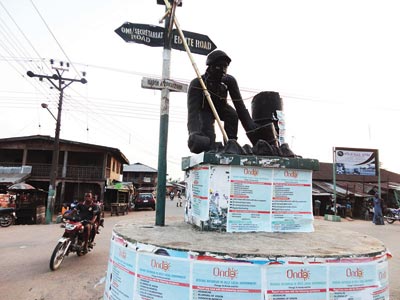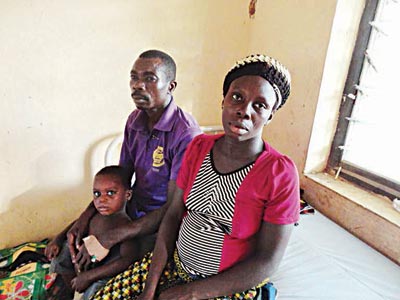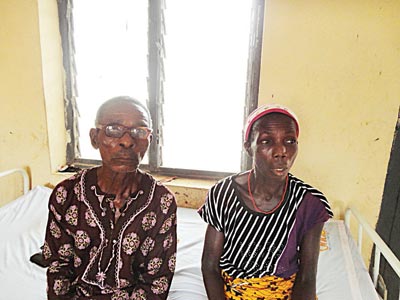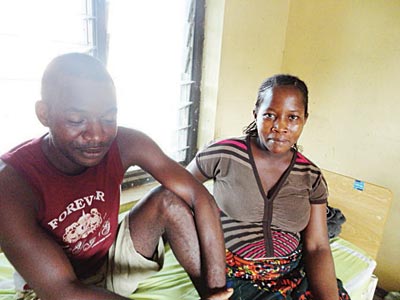
JUST about 20 minutes to Ore, in Ondo State, is Ode-Irele, the headquarters of Irele Council.
The road to Ode-Irele is smooth. Cool breeze welcomes visitors to the faming community. Even as you travel down the road to the town, you see green farm settlements made of shrubs on both sides.
Kola-nuts, palm and cocoa trees and other cash crops formed a thick forest on both left and right sides of the road, as you approach the town that is also adorned with banana and plantain trees.
On the left, is a big Celestial Church of Christ (CCC) building, with a big fenced roofing canopy ostensibly for deliverance purposes, very close to a small culvert, with water rushing down slowly to the other side of the road.
The ancient town remains peaceful, even after the recent mysterious deaths of about 23 people that rattled the residents.
Although people are still expecting the final laboratory results of the actual cause of deaths from the blood samples of the victims taken to the laboratories in Lagos and Ibadan, preliminary medical reports showed that the victims died of methanol poisoning.
Most of the affected people had headache, blurring of vision, sudden blindness, loss of consciousness and death.
The state Commissioner for Health, Dr. Dayo Adeyanju, in a recent press release, traced the deaths to the consumption of local gin (ogogoro) contaminated with methanol.
Therefore, the state Ministry of Health advised people to avoid drinking of gin for now until the present contaminated gin was taken out of circulation.
Producers and sellers of the local gin were also advised to stop production and sales for now till further notice.

On the contrary, the locals believe that Malokun, the deity of the town, only fished out the culprits who broke into its shine and carted away some artifacts, which is considered a sacrilege and has never happened in the history of the town.
The shrine is located at the outskirts of the town. It is fenced round and even the villagers confirmed that Malokun is a peaceful god and they used to enter through the fence and took the photography of the drawing (probably of Malokun deity), colourfully painted on the wall of the building- a fiery snake and three carved images of local gods.
The one at the centre is fat and tall (wearing a hat), with its hands placed on the smaller ones on his left and right. They used to put the photographs on T-Shirts.
There is another image of a man close to the entrance of the shrine standing like a security guard, with hands on its head.

Speaking on the incident, the Gbogunron of Irele Kingdom (the head of the worshipers of Malokun), Oloruntosin Mesagan, disclosed that some hoodlums forced their way into Malokun shrine and “went away with valuable artifacts that should not be seen with ordinary eyes; artifacts that had been there for the past 200 to 300 years of the existence of this community.
“It is only Kabiyesi (the traditional ruler of Irele), myself and the boys working with me that ought to have access to the place.
“We used to make sacrifice to Malokun every five days. It was when we wanted to make another sacrifice that we discovered the incident.”
He disclosed that after he told the Kabiyesi what happened, they placed curses on those involved.
“We said that Malokun should destroy the culprits; that they should become blind and die.
“It is exactly what we said that happened to those people.”
Mesagan boasted that three to four days after they placed the curses, the thieves started dying. “Three of them died the same day. The second day, six people died the same way.
“We don’t know what we happen to the victims in the hospital. May God forgive them.”
He explained that Malokun is the deity providing security for the town, adding: “The lesson is that they don’t joke with a deity. Let everybody work hard. Don’t steal.
“Before performing the sacrifice, we restrict the movement of the people in the area for about 30 minutes.”
A member of the Ondo State Hospital Management Board from Irele, Femi Okunjemiruwa, recalled that about two weeks ago, they received a distress call in Akure from Irele that four people had died in mysterious circumstances in Ode-Irele.
“Immediately, we got the information my bosses, the Commissioner for Health, Dr Dayo Adeyanju, Chairman Hospital Management Board, Dr. Niran Okunribaye summoned us for a meeting and there and then directed that some of us should relocate to Irele immediate, so as to really find out the causes of deaths.”
He said: “It was alleged that the spirit behind those artifacts entered the town and was fishing out the people that committed the atrocity. After two or three days when we had recorded more deaths, we discovered that not all the people that were dying could actually commit that atrocity.
“We noticed a trend in all these deaths; the fact that they were all people addicted to a local gin called ogogoro.”
He added that upon that discovery, with the intervention of World Health Organisation (WHO), United Nations Children’s Fund (UNICEF), the Federal Ministry of Health, the state government, through the state ministry of Health, took samples of the local gin to various laboratories in Lagos, Ibadan and other places for analysis to determine its chemical content, because there was this allegation that the local gin contain a poisonous substance called methanol.
“While we await the report of those laboratories tests, we have embarked upon massive mobilisation and sensitisation of our people about the danger inherent in further consumption of this local gin.”
Okunjemiruwa explained that they have had meeting with local producers of the gin and enjoined them to stop further production for now.
“We have also held series of meetings with traditional institutions, market women, National Union of Road Transport Workers (NURTW), okada riders, Iyaloja, youths, etc to sensitise them why they should stop the consumption of the gin.
“The effect is that we now notice a drastic reduction of number of deaths.”
According to him, five of the victims were at the University College Hospital (UCH), Ibadan receiving treatment, and they were responding to treatment.
Same for the three cases at Irele General Hospital; hence he urged the people to abstain from further consumption of the gin, pending the final investigation and result of the laboratory tests being carried out by the government.
He added: “After all, during the time of Ebola outbreak, we were advised to stay away from eating bush meat and everybody at that time did so.
“So, I appeal to them to keep to our advice.”
The Chairman of Irele Local Government, Mr. Dele Olatunji, said as soon as he became aware of the mysterious deaths in Irele, he telephoned Governor Olusegun Mimiko and told him what happened.
“He sent his commissioner for Health, with some doctors, to find out what actually transpired.”
Olatunji admitted that just about the same time some miscreants burgled Malokun shrine in Irele:
“The Kabiyesi told me that they made away with some artifacts and we initially thought it was that that caused the deaths of those people.”
He added that it was later discovered that some people took ogogoro that was contaminated with methanol, insisting: “The people died from methanol poisoning and not from pesticide. Twenty-three people, mostly males, between the ages of 20 and 45.”
He said having discovered that, he went round communities in the area to sensitise the public on the danger of taking alcohol contaminated with methanol and impounded the contaminated alcohol from some brewers.
“We thank God that no more cases of abnormal deaths have been reported. Recently, we received the news that a woman from Omi, a neighbouring community, died.
“Before the end of the day, they reported another case to us that a woman was about to die. We went there and took her to Irele General Hospital and she is still there receiving treatment.”
Medical Director of Irele General Hospital, Dr. Sanni Ayomide said that the government was on top of the situation.
“What we are suspecting is methanol poisoning. Most of the victims are responding to treatment; it is only the blindness that is left. We hope that they will be well, because methanol poisoning causes permanent blindness.
“There are no new cases; we are only nursing the three victims (one of them a woman) in the hospital,” he stated.
He urged the people to desist from consuming local gin or others, such as ere, opa eyin, gemugemu, etc, as well as production and selling of any form of local gin until further notice.
He also warned people to guide against self- medication and anybody with symptoms of methanol to report to the hospital.
“If you have any illness, consult your doctor. We thank God that methanol poisoning is not infectious, but to prevent it from happening again, let the government try and bring to justice those selling those chemicals.”
At the hospital, the eyes of the visually impaired victims of the incident were wide opened. But they cannot see. Yet, the sickness did not stop them from eating normally.
They were all furious that the government had “abandoned” them and needed more attention from the doctors.
“We are tired of answering questions, but no treatment?” one of them said.
In the process, a doctor came into the ward and raised his three fingers and asked one of them, Aribo Michael, how many his fingers he was raising.
Michael said unsurely: “I think four fingers.”
Again, the doctor asked Michael to come out of the hospital ward, which he did and went back to his bed again.
“Are you getting better now?” the doctor asked him. And Michael responded affirmatively.
“If it was in the evening, I will be able to see better,” he added.
Michael, 25, from Ode-Irele, said he had stopped drinking ogogoro for a long time, yet he was affected with the strange ailment after he ate a local delicacy, eba.
“The sickness started with vomiting, so they rushed me to the General Hospital. They tested me and said it was typhoid. They have taken my blood sample.
“I need more assistance from the government to regain my sight,” he said on his hospital bed.
His wife, Gloria, added: “Not quite long we got to the hospital, he lost his sight. We want the government to help us,” she stated.
There was an argument between the only woman among them, Margaret Omonigho, and her husband, Olomigonu, over her claim that she had stopped drinking alcohol a long time ago.
“You still drink,” he told his wife, who was furious and insisted that she stopped drinking quite a long time ago, since she was told that ogogoro was dangerous to her health.
Margaret, a farmer from Delta State, explained that the sickness started with headache and later she lost her sight.
“Since they told me that I should stop drinking alcohol, I stopped. I don’t know what caused the blindness.”
Her husband, also a farmer, said he went to Opara in Delta State with his wife for a ceremony when hoodlums allegedly burgled the Malokun shrine.
He recounted: “We did not hear anything before we travelled. It was after the ceremony that my wife started feeling headache and about 30 minutes later, she said she could no longer see.
“So, we decided to go to where we are living. We came to Omi (about 15 kilometre to Ode-Irele).”
He later got to know that there were some doctors at Ode-Irele General Hospital treating people with similar problem.
Olomigonu recalled that his wife ate rice and drank local gin before the problem started, saying: “She used to come to the market at Ode-Irele to buy the local gin.”
He wants the government to help his wife to regain her sight.
Another victim, Fadahunsi Iwajomo, 35, a farmer and father of six from Ode-Irele, admitted that he sometimes takes ogogoro, and his sickness started with fever.
“After three days, they took me to the hospital and I was treated and became well. Three days ago, I slept and woke up with blindness. I have six children.”
Iwajomo said he ate pupuru, a local delicacy, shortly before his problem started.
His wife, Aduke, 25, added that the sickness started like malaria and she rushed him to a private hospital in Ode-Irele, from there they were referred to the General Hospital.
“I want the government to save my husband from death. I have two boys and four boys,” she cried out.
At the UCH, nobody was allowed to see the victims. According to the Assistant Director of Information, Ayodeji Bobade: ”Even WHO officials were not allowed to see the five patients from Irele admitted here. They are now federal government patients, not patients of the Ondo State government again.
“We are managing them very well. We are going to call a press conference soon.”
However, a lecturer at the Department of Virology, College of Medicine, University of Ibadan said it is possible the victims died of methanol poisoning, because the way they died is the same way methanol poisoning kills people.
“The use of methanol is highly controlled. Even industries ought to get special permission to use methanol. You don’t get it in the open market; it is only licenced vendors that sell it.
“Their own contamination must have been cause by locally fermented methanol from palm wine. I don’t know whether there is a way it can be controlled. But at the end of the day, it is the same methanol chemical composition, which is used as a disinfectant in the lab.
“It is not good to consume any locally home- brewed alcohol because it can be contaminated with methanol used as pesticides. If those people took a drink that contain methanol, it can lead to serious health risk and they will still die the same way,” she stressed.
“There is the high possibility of methanol contamination in locally-produce gin. In industrial gin, there is a way the manufacturers can control it with technologies specifically designed for it.
“It also depends on the level of tolerance of individuals. So, all the people that took it may not die.”
She said when methanol poisoning happened in Australia, some of the victims also died and others became seriously ill.
An Ophthalmologist at UCH also warned that methanol is dangerous to the eye nerves and can lead to blindness.
“It can be revised with early presentation at the hospital, but the eyes will not go back to the way it was before the damage was done.
“Methanol is not something you just find in the environment; you only find it in mentholated spirits or local gin.
“There should be some legislation against illegal gin making,” she suggested.
Also, Head of Department of Psychology (HOD), University of Ibadan, Prof Benjamin Ehigie, said the victims must have ingested some chemical substances.
“The traditionalists believed that it is their gods that killed the victims. We know it is possible, but it cannot be proven scientifically,” he stated.
He recalled that through the knowledge of science it has been discovered that diabetes, kidney failure, liver problem and other terminal diseases exist, which were believed to be caused by the wrath of gods.
“I will not scientifically subscribe to that. The government must carryout a multidisciplinary research that should include social scientists to find out the causes of the deaths of the people in Ode-Irele. The environment needs to be studied to really find out why it happened.
“There is no way we can analyse the spiritual aspect; we cannot subject that to scientific experimentation.
“The belief system is part of culture and there is no way we can eliminate belief from culture, but you cannot subject any spirit into scientific experiment,” he said.
Similar stories
FG allays fears over strange ailment in Ondo
Irele deaths: Ondo govt awaits test result, natives say gods are angry




